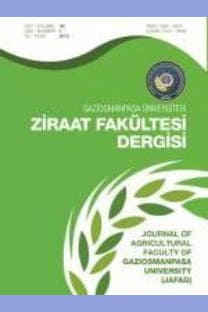Acanthiophilus helianthi (Rossi) (Diptera: Tephritidae)’nin Van (Türkiye) İli’nde Beş Farklı Aspir Çeşidinde Popülasyon Gelişimi ve Parazitoitleri
Acanthiophilus helianthi, aspir, parazitoitler, populasyon gelişimi
Population development of Acanthiophilus helianthi (Rossi) (Diptera: Tephritidae) On Five Different Safflower Varieties in Van, Turkey
Acanthiophilus helianthi, parasitoids, population development, safflower,
___
- Al‐Ali, A., Al‐Neamy, S.I.K., Abbas, S. A., Abdul‐Masih, A.M.E., (1977). On the life history of the safflower fly Acanthiophilus helianthi Rossi (Diptera: Tephritidae) in Iraq 1. Zeitschrift fuer Angewandte Entomologie. 83(1‐4), 216-223. https://doi.org/10.1111/j.1439-0418.1977.tb02391.x
- Basheer, A., Asslan, L., Abdalrazaq, F., (2014). Survey of the parasitoids of the tephritid fruit flies of the safflower Carthamus tinctorius (Asteraceae) in Damascus, Syria. Egyptian Journal of Biological Pest Control. 24(1), 169-172. https://doi.org/10.13140/2.1.2425.6648
- Chi, H., Liu, H., 1985. Two new methods for the study of insect population ecology. Bulletin of the Institute of Zoology Academia Sinica. 24(2), 225-240.
- Chi, H., (1988). Life-table analysis incorporating both sexes and variable development rates among individuals. Environmental Entomology. 17(1), 26-34. https://doi.org/10. 1093/ee/17.1.26
- Chi, H., (2021). TWOSEX-MSChart: a computer program for the age-stage, two-sex life table analysis. National Chung Hsing University, Taichung, Taiwan. TWOSEX-MSChart:http://140.120.197.173/Ecology/Download/Twosex-MSChart-exe-B100000.rar (Version 2021.11.06).
- Damkacı, S.A., (2013). Konya ilinde aspir (Carthamus tinctorius: Asteraceae) Ekim Alanlarında Zararlı Böcekler ve Predatörleri (Yayın No: 327042) [Yüksek lisans tezi, Selçuk Üniversitesi Fen Bilimleri Enstitüsü], Konya,45.
- Dustiy, Z., Abbasipour, H., Askarianzadeh, A., (2014). Interaction effects between time and cultivar on the seasonal fluctuations of the safflower fly, Acanthiophilus helianthi (Rossi)(Diptera: Tephritidae), and its parasitoids in the south of Tehran. Archives of Phytopathology and Plant Protection, 47(10), 1195-1201. https://doi.org/10.1080/03235408.2013. 834716
- Ekin, Z., (2005). Resurgence of safflower (Carthamus tinctorius L.) utilization: A global view. Journal of Agronomy. 4(2), 83-87. https://doi.org/10.3923/ja.2005.83.87
- Esfahani, M.N., Alizadeh, G., Zarei, Z.M., Esfahani, N., (2012). The main insect pests of safflower on various plant parts in Iran. Journal of Agricultural Science and Technology. A. 2 (11A), 1281-1289
- Han, H. Y., Ro, K. E., (2018). Discovery of a naturally occurring individual of Acanthiophilus helianthi (Rossi) (Diptera: Tephritidae) in Korea, a managed quarantine pest by the Korean animal and plant quarantine agency. Journal of Asia-Pacific Entomology, 21(4), 1262-1267. https://doi.org/10.10 16/j.aspen.2018.09.011
- Kayaçetin, F., Katar, D., Arslan, Y., (2012). Aspir (Carthamus tinctorius L.)’in döllenme biyolojisi ve çiçek yapısı. Tarla Bitkileri Merkez Araştırma Enstitüsü Dergisi. 21(2), 75-80.
- Khuhro, S. A., Mari, J.M., Jatoi, G.H., Soomro, N., Leghari, U.A., Mengal, A.N., (2021). Resistant Cultivars of Safflower Carthamus tinctorius based on Yield Performance and Infestation against Acanthiophilus helianthi (Diptera: Tephritidae). International Journal on Emerging Technologi es12(1), 175-180.
- Lotfalizadeh, H., Gharali, B., (2014). Hymenopterous parasitoids of safflower seed pests in Iran. Applied Entomology and Phytopathology. 82(1), 1-11.
- Mirshekari, M., Amiri, H.N.R., Moslehi, A., Zandvakili, O.R., (2013). Effect of sowing date and irrigation treatment on safflower seed quality, Journal of Agricultural Science and Technology. 15(2), 505-515.
- Nimbkar, N., (2008). “Issues in safflower production in India, 1-9”. 7th International Safflower Conference, (3-6 Nowember 2008, Wagga NSW Australia).
- Riaz, M., Sarwar, M., (2014). A new record of safflower fly Acanthiophilus helianthi (Rossi) of genus Acanthiophilus Becker in subfamily Tephritinae (Diptera: Tephritidae) from the Fauna of Pakistan. Journal of Agriculture and Allied Sciences. 3(1), 39-44.
- Sabzailian, M.R., Saeidi, G., Mirlohi, A., Hatami, B., (2010). Wild safflower species (Carthamus oxyacanthus): A possible source of resistance to the safflower fly (Acanthiophilus helianthi). Crop Protection. 29(6), 550-555. https://doi.org/ 10.1016/j.cropro.2009.12.013
- Saeidi, K., Adam, N.A., (2011). A survey on pest insect fauna of safflower fields in the Iranian Province of Kohgiloyeh and Boyerahmad. African Journal of Agricultural Research. 6(19), 4441-4446. https://doi.org/ 10.5897/AJAR11.966
- Saeidi, K., Nur-Azura, A., Omar, D., Abood, F., (2011). Pests of safflower (Carthamus tinctorious l.) and their natural enemies in Gachsara, Iran. South Asian Journal of Experimental Biology. 1(6), 286-291. https://doi.org/10.38150/sajeb.1(6) .p286-291
- Saeidi, K., Mirfakhraie, S., Mehrkhou, F., (2016). Hymenopterous parasitoids attacking Acanthiophilus helianthi Rossi (Diptera: Tephritidae) pupae in Kohgiloyeh safflower farms of Iran. Journal of Entomological and Acarological Research. 48(3), 308-313. https://doi.org/10.40 81/jear.2016.5085
- Singh, V., Nimbkar, N., (2006). Safflower (Carthamus tinctorius L.). Genetic Resources, Chromosome Engineering, And Crop Improvement Crc Press, Boca Raton, 320 pp.
- Şengonca, Ç., (1983). Çukurova bölgesindeki aspir zararlıları üzerinde bir araştırma. Türkiye Bitki Koruma Dergisi 7(2), 117-127.
- Talpur, M.A., Hussain, T., Rustamani, M.A., Gaad, M.A., (1995). Relative resistance of safflower varieties to safflower shoot fly, Acanthiophilus helianthi Rossi (Diptera: Tephritidae). In Proceedings of Pakistan Congress of Zoology, 15(11), 177-181.
- Taşlıgil, N., G, Şahin., (2016). Stratejik önemi artan bir endüstri bitkisi: Aspir (Carthamus tinctorius L.). Türk Coğrafya Dergisi. (66), 51-62. https://doi.org/10.17211/tcd.48394
- ISSN: 1300-2910
- Yayın Aralığı: 3
- Başlangıç: 1985
- Yayıncı: Tokat Gaziosmanpaşa Üniversitesi Ziraat Fakültesi Dergisi Yayın Ofisi
Muhammed Rafiq HAFİZ, Şerife TOPKAYA
Tuğça BİLENLER, İhsan KARABULUT
Bekir Erol AK, Mesut CAN, İzzet AÇAR, Ibrahim Halil HATİPOGLU, Birgül DİKMETAŞ
Muhammed Akif AÇIKGÖZ, Ebru BATI AY, Şevket Metin KARA, Ahmet AYGÜN
Can Okan ALTAN, Demet KOCATEPE, Mehmet Sedat İPAR, Bengünur ÇORAPÇI, Bayram KÖSTEKLİ, Hülya TURAN
